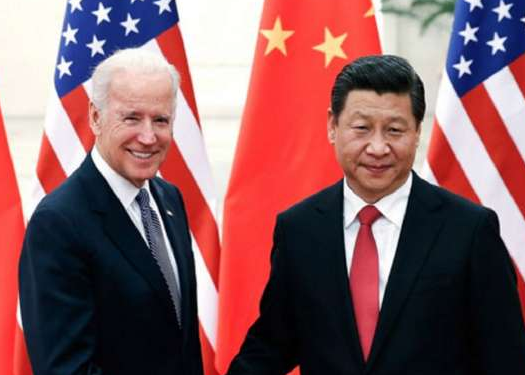Beijing: Ahead of the virtual summit between Chinese President Xi Jinping and his US counterpart Joe Biden next week, Beijing on Saturday asked Washington to stop support for Taiwan’s independence, and said the two countries should meet halfway to repair the bilateral ties.
Xi will hold a virtual meeting with Biden Tuesday morning, Chinese Foreign Ministry spokesperson Hua Chunying said Saturday.
The presidents will exchange opinions on China-US relations and issues of common concern, Hua said.
Xi and Biden have so far had two lengthy phone conversations this year as part of an effort to ensure stability in one of the world’s most consequential and fraught relationships.
Ahead of the Xi-Biden meeting, Chinese Foreign Minister Wang Yi has said China and the US should meet each other halfway to ensure a successful virtual summit between their two leaders and bring bilateral ties back to the right track.
Wang made the remarks in a phone conversation with US Secretary of State Antony Blinken on Saturday, the official Xinhua news agency reported.
On Taiwan, which China claims as part of its mainland, Wang said that the history and the reality have proved that “Taiwan independence” is the biggest threat to the peace and stability of the region.
Any support to “Taiwan independence” will damage regional peace and eventually cause damage to itself, Wang said.
He urged the US to state its opposition to any “Taiwan independence” moves clearly and firmly uphold the commitments made in the three China-US joint communiques.
He also called on the US to stick to its one-China policy with concrete actions instead of sending wrong signals to “Taiwan independence” forces.
Blinken was quoted by the official media here as saying that both sides are fully prepared for the summit as it will garner great attention around the world.
Friday, White House Press Secretary Jen Psaki said that President Biden will discuss with President Xi ways to responsibly manage the competition between the United States and China, as well as ways to work together where our interests align.
“Throughout, President Biden will make clear US intentions and priorities and be clear and candid about our concerns with the PRC,” Psaki said in a statement.
Tensions between the two countries have deepened since the two leaders had a lengthy phone call in September, the surprise announcement of the AUKUS military alliance between the US, Britain and Australia, to counter China’s growing military presence in the Asia-Pacific, as well as the US firming up the Quad alliance with Australia, India and Japan.
The US has also been expanding ties with Taiwanese government officials.
Ahead of the summit, the two countries, which are the top two emitters of global greenhouse gases, together accounting for about 40 per cent of the world’s annual carbon output, reached a surprise agreement to cooperate on limiting emissions to address the global climate crisis.
The agreement, announced at the UN COP26 climate conference in Glasgow, aims to accelerate emissions reductions toward the goals set in the 2015 Paris Agreement, which mandated emissions cuts that would keep the global temperature rise below 2 degrees Celsius relative to pre-industrial times, with a target of 1.5 degrees Celsius.
It was seen as a major diplomatic breakthrough between the two countries as their current state of relations are going through turbulent times with Biden mostly carrying forward his predecessor Donald Trump’s tough policy towards Beijing.
The Biden administration has worked more with traditional US allies to collectively put pressure on Beijing on a range of issues, including human rights, Taiwan, Xinjiang and Tibet.
Biden has also stepped-up America’s engagement in the Indo-Pacific region, which has seen aggressive moves by the Chinese military.
Last month, Nicholas Burns, Biden’s pick to be the US envoy to China said Beijing should halt its “genocide in Xinjiang, its abuses in Tibet, its smothering of Hong Kong’s autonomy and freedoms, and its bullying of Taiwan”.
PTI






































